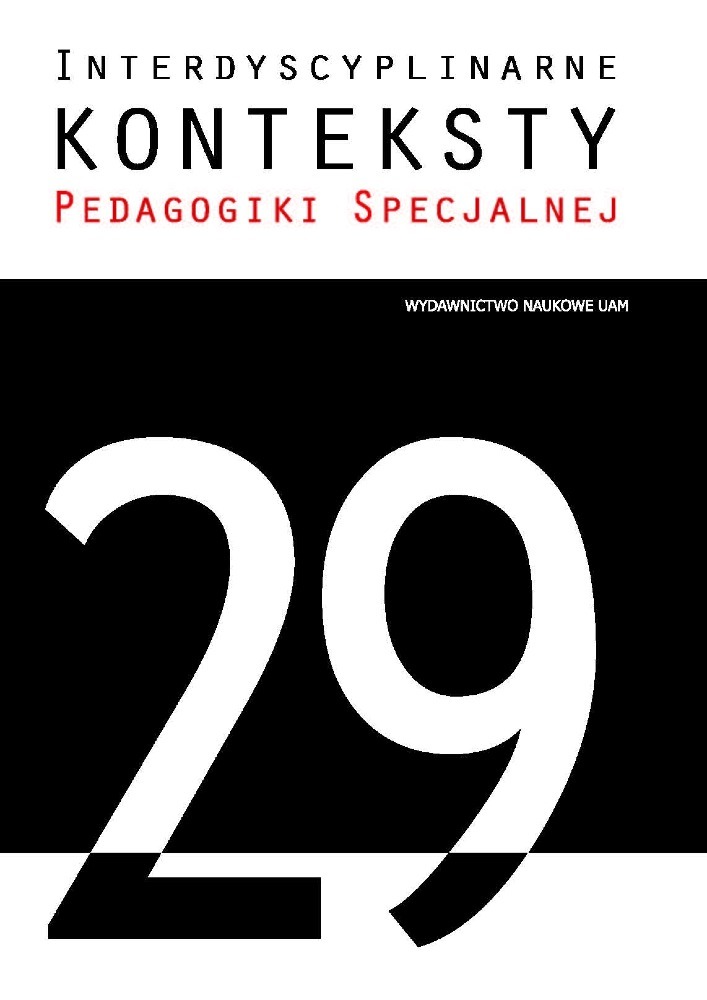Abstrakt
Changes in the ways of performing professional roles of special education teachers entail the need to develop new solutions for academic education for teachers of the visually impaired. The assessment of the content and forms of the previously proposed education for teachers of the visually impaired from the perspective of the usefulness of their professional competencies may be helpful in the determination of the needed directions of changes in this respect. The aim of the article is to describe and analyse the results of comparative research on visual impairment pedagogy graduates educated in the system of 5-year uniform master’s studies and 3-year bachelor’s studies, concerning the course of their educational and professional paths.
Bibliografia
Chodkowska M., Razem damy sobie radę! W drodze do zintegrowanego społeczeństwa, WSiP, Warsaw 2009.
Chrzanowska I., Edukacja włączająca – wyzwanie dla kompetencji pedagogów specjalnych, „Studia Edukacyjne” 2018, no. 48, pp. 23–32.
Correa-Torres S.M., Howell J.J., Facing the challenges of itinerant teaching: Perspectives and suggestions from the field, “Journal of Visual Impairment & Blindness” 2004, no. 98(7), pp. 420–433.
Czerwińska K., Nauczyciel ucznia z niepełnosprawnością wzroku – kierunki zmian w polskim systemie edukacji, [in:] Nauczyciel we współczesnej edukacji. Diagnoza – Rozwój – Zmiana, ed. M. Kamińska, Z.P. Kruszewski, A. Gretkowski, B. Skałbania,
Oficyna Wydawnicza Szkoły Wyższej im. D. Kukla, Difin, Warsaw 2016, pp. 351–365.
Dote-Kwan J., Chen D., Hughes M., A national survey of service providers who work with young children with visual impairments, “Journal of Visual Impairment & Blindness” 2001, no. 95(6), pp. 325–337.
Dycht M., Edukacja włączająca uczniów z dysfunkcją wzroku w Polsce – wdrażanie zobowiązań i analiza wątków zaniedbanych, „Niepełnosprawność i Rehabilitacja” 2015, no. 2, pp. 34–49.
Griffin-Shirley N., Koenig A.K., Layton C.A., Davidson R.C., Siew L.K., Edmonds A.R., Robinson M.C., A survey of teachers of students with visual impairments: responsebilities, satisfactions, and needs, “RE:view” 2004, no. 36(1), pp. 7–20.
Janiszewska-Nieścioruk Z., Trudności związane z implementacją probolońskich zmian w kształceniu pedagogów i nauczycieli, „Niepełnosprawność i Rehabilitacja” 2013, no. 1, pp. 42–53.
Kesiktaş A.D., Akcamete A.G., The relationship of personnel preparation to the competence of teachers of students with visual impairments in Turkey, “Journal of Visual Impairment & Blindness” 2011, no. 105(2), pp. 108–124.
Kupisiewicz M., Pedagog specjalny – człowiek o wyjątkowych predyspozycjach osobowościowych, profesjonalista posiadający rozległą, interdyscyplinarną wiedzę i umiejętności, „Studia z Teorii Wychowania” 2016, no. 4(17), pp. 173–186.
Lee H.-G., Kim J.-H., Kang J.-G., The Assessment of Professional Standard Competence of Teachers of Students with Visual Impairments, “International Journal of Special Education” 2008, no. 23, 2, pp. 33–46.
Pańczyk J., Kształcenie pedagogów specjalnych w Polsce, [in:] Historyczne dyskursy nad pedagogiką specjalną, ed. J.J. Błeszyński, D. Baczała, J. Binnebesel, Wydawnictwo Naukowe WSEZ, Łódź 2008, pp. 51–63.
Parys K., Olszewski S., Ewolucja poglądów na temat kształcenia pedagogów specjalnych w Polsce, „Niepełnosprawność. Półrocznik naukowy” 2009, no. 1, pp. 103–112.
Smith D.D., Pedagogika specjalna, tom I, Wydawnictwo APS, Wydawnictwo Naukowe PWN, Warsaw 2009.
Spungin S.J., Ferrell K.A., Monson M., The role and function of the teacher of students with visual impairments, Position paper of the Division on Visual Impairments, Council for Exceptional Children. Arlington, VA 2016.
Suvak P.A., What do they really do? Activities of teachers of students with visual impairments, “RE:view” 2004, no. 36(1), pp. 22–31.
Wolffe K.E., Sacks S.Z., Corn A.L., Erin J.N., Huebner K.M., Lewis S., Teachers of students with visual impairments: What are they teaching?, “Journal of Visual Impairment & Blindness” 2002, no. 96, pp. 293–303.
Zaorska M., Aktywność społeczna osób dorosłych niepełnosprawnych wzrokowo – możliwości i ograniczenia, [in:] Wybrane konteksty i wyzwania współczesnej pedagogiki specjalnej, ed. K. Barłóg, Wydawnictwo URz, Rzeszów 2017, pp. 27–42.
Zaorska M., Tyflopedagog wobec problemu aktywności życiowej – zawodowej i prozawodowej osób dorosłych z niepełnosprawnością wzrokową, Wydawnictwo Edukacyjne „Akapit”, Toruń 2015.
